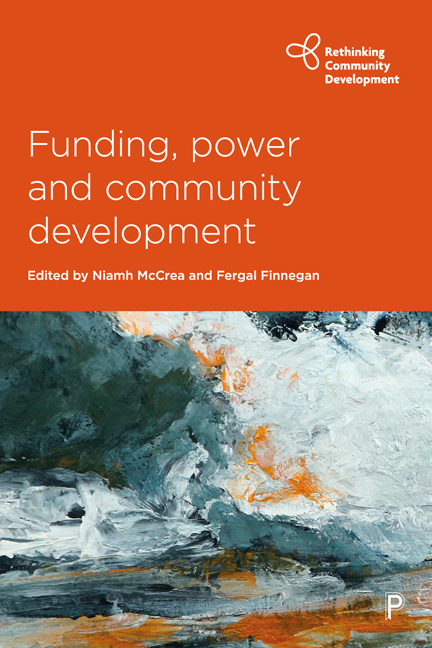Book contents
- Frontmatter
- Contents
- Series editors’ preface: Rethinking Community Development
- Acknowledgements
- Abbreviations
- Notes on contributors
- One Funding, power and community development: an introduction
- PART 1 New configurations of power and governance
- PART 2 Questions of state and grassroots democracy
- PART 3 Modes of agency and horizons of possibility
- Index
Seven - Funding community organising: diversifying sources, democratising civil society
Published online by Cambridge University Press: 19 April 2022
- Frontmatter
- Contents
- Series editors’ preface: Rethinking Community Development
- Acknowledgements
- Abbreviations
- Notes on contributors
- One Funding, power and community development: an introduction
- PART 1 New configurations of power and governance
- PART 2 Questions of state and grassroots democracy
- PART 3 Modes of agency and horizons of possibility
- Index
Summary
Introduction
Throughout the history of community organising in the United States, funding has been a serious and, until recently, neglected issue (Fisher, 1994). This chapter recognises the variety, complexity and contested politics of community organising, a practice that ranges from consensus-based community building to more conflict-oriented grassroots organising confronting oppression. Our main interest is the need for movement-like organising for economic and social justice at the local level and beyond. Since 2008, funding for organising in the US has declined. A 2009 National Organizers Alliance survey of 203 community organisations reported that 65% of respondents had undergone dramatic funding cuts since the recession, 40% had depleted their financial reserves, and 33% survived on a month-to-month basis (Waheed et al, 2010). According to an Urban Institute study, community organising organisations were hit the hardest (Boris et al, 2010). While there has been increasing interest in community organising since the election of Obama in 2008, ‘one of the most important questions facing organisers [remains] can we translate this growing public awareness into serious funding that will propel growth and strengthen the field?’ (Dorfman and Fine, 2009: 2).
This chapter will make the case that an over-reliance on progressive philanthropic sources has resulted in the underfunding of community organising. It has also contributed to the depoliticisation of ‘civil society’ (we will scrutinise the use of this term more closely later) and has obscured the potential role the state can play in achieving egalitarian social change. We argue that it is time to diversify funding sources for community organising and to re-evaluate debates in the field about the limits and difficulties associated with state funding.
We foreground a case study from outside the US – the Community Organising Programme (COP) (2011–2015) in England – to illustrate how state funding for community organising can lead to progressive outcomes, even when initiated by a Conservative government that is firmly committed to neoliberal policies. Community organisers in the US have, we believe, much to learn from this programme. We argue that a failure to advocate for greater state support for US community organising unintentionally reinforces the delegitimisation of the state which has occurred under neoliberalism and limits the scope and power of grassroots organising.
- Type
- Chapter
- Information
- Funding, Power and Community Development , pp. 103 - 118Publisher: Bristol University PressPrint publication year: 2019

